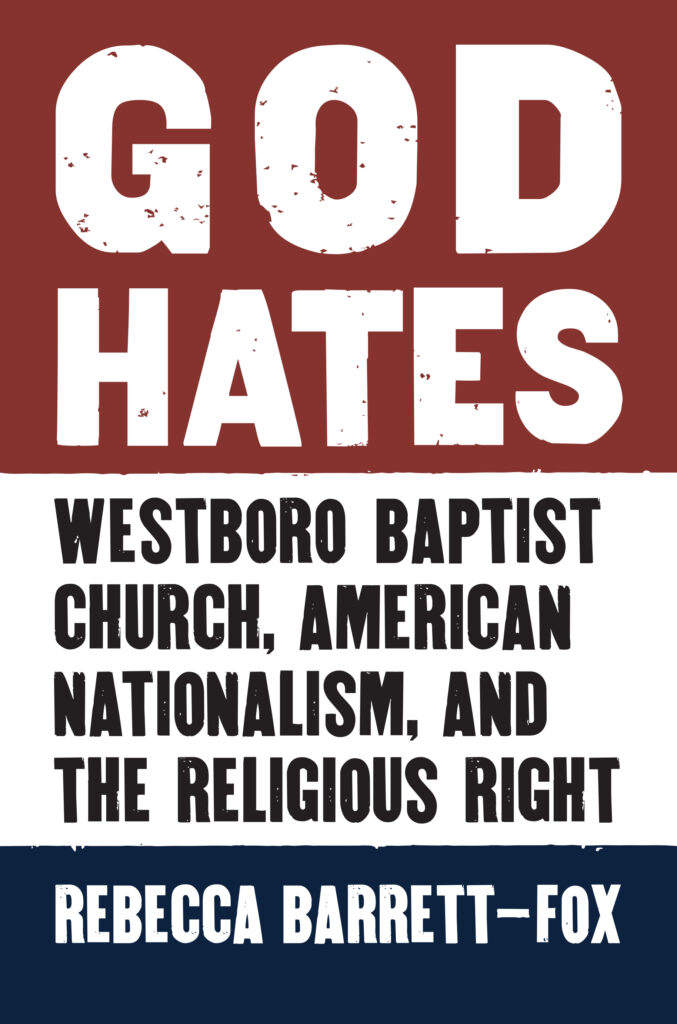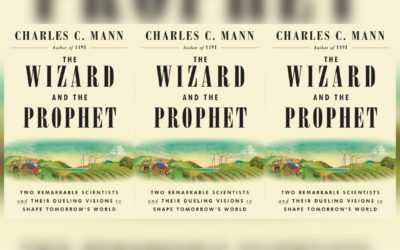God Hates. Those are the first words I’ve seen the past few mornings, as this book sits on my coffee table. When I take it to read at the park or the library, I slip off the red, white and blue sleeve into my bag. There’s enough hateful rhetoric going around these days, I don’t want people to think I’m buying into it.

But the cover’s aggressive design serves a purpose: to prepare the reader for the content that lies within. This isn’t a light read to take to the lake; that’s author Rebecca Barrett-Fox’s first lesson. The subject of the book, Westboro Baptist Church, or WBC, is infamous for picketing funerals of fallen soldiers and members of the LGBT community. Through the course of the book, Barrett-Fox goes deeper than their public image. Midwest-nice turns to Midwest-complacency, and at the end the reader is forced to ask: How did I contribute to creating this monster?
She meticulously outlines their theology, history, ministry and political ideology, approaching them with more compassion than I expected, and at times, more than I thought they deserved. After all, this is the group that holds signs saying, “God hates fags,” and, “Pray for more dead kids,” as friends and family mourn their dead.
Why spread hate? Although they are known for publicly urging others to find God, Barrett-Fox reports that the goal of Westboro Baptists is not to convert, but rather to inform. Westboro Baptists say they don’t hate any particular group of people. They simply use scripture to deduce what behaviors God hates: premarital and gay sex, military expansion and Catholicism, to name a few. Because God clearly states opposition to these behaviors (and yes, they do view homosexuality as a choice), Westboro Baptists believe America’s increased support of gay rights and military culture positions our country as a target for God’s wrath. The church refers to every soldier’s death as a “Godsmack,” which Barret-Fox sums up as “acts of God that contribute to human suffering and so reveal God’s hatred toward the world, illustrating the absolute predestination of all things for the purpose of sorting the elect from the damned.” Barrett-Fox balances her academic research with a narrative flow like this that integrates a large volume of diverse resources (first person narratives, media interviews, church blogs, sociological studies), all of which are extensively catalogued in her notes section.
While reading, I kept thinking of Westboro Baptists as heaven’s foreign relations department, using activism and dialogue to inform the world about what might start a war between humanity and God. But according to their Calvinist theology, even their own fates are already sealed. Westboro Baptists believe in pre-destination, the intricacies of which Barrett-Fox devotes an entire chapter. As opposed to other forms of Baptist faith, Westboro Baptists believe that God actively damns and elects, as opposed to actively saving a sample few and leaving the rest of us to fend for ourselves. Barrett-Fox says this complicates their passion for preaching and picketing. Their mission is not to save. It is to warn, and they’re not concerned with their small numbers. Their righteousness hinges on the fact that they remain isolated from the rest of the world. “In this sense, Westboro Baptists’ public ministry is more about them than it is about the listener,” Barrett-Fox writes.
Barrett-Fox also spends a chapter discussing the free speech battles that surround WBC. Are they a hate group? Should their message be protected by the first amendment? To me, this legal topic is less interesting than the theological and political components of the book, but it was a necessary primer for the discussion of Religious Nationalism that follows. Westboro Baptists do not align with the Religious Right, in large part because they target a symbol that religious conservatives hold so dear: “the Christian, heteronormative war hero.” Picketing the funerals of America’s fallen soldiers chips away at the country’s ideals of heroism, masculinity and righteousness. Citizens’ cries foul, and our true morals are exposed. Barrett-Fox says the policies and public discussions that seek to protect fallen soldiers but fail to address WBC’s gay victims uncovers a “homophobia already present in contemporary America.”
And that circles back around to us. The Westboro Baptist Church wasn’t created in a vacuum. In fact, its founder, Fred W. Phelps, to whom Barrett-Fox devotes the better part of the first chapter, was a leader in civil rights litigation in Topeka before creating the Church. Eventually, he was disbarred due to personal misconduct issues, but not before being regionally celebrated for his work in challenging racial discrimination, which included recognition from a Kansas branch of the NAACP in 1987. Kansas policies provided an environment for Phelps’ anti-gay agenda to flourish. While the Religious Right may turn their noses at WBC’s vitriolic rhetoric, it is their quiet support of their underlying values that creates policies steeped in theology.
Barrett-Fox ends the book with a subtle call-to-action, a move that somewhat surprised me, given her overall academic tone. “The goal of opponents, then, should not be to silence church members…but to give no aid or comfort to the message, to reject its underlying theology,” she writes. WBC is a “sanctuary” for hate, but the frontline exists in our own pews, in our own communities and in our own minds. Barrett-Fox allows a group so widely despised to emerge as human and complicated like the rest of us. While the text dissects WBC’s cruelty, the book’s resonating message is not to focus on their moral shortcomings, but our own. In a time so filled with hate rooted in religion and flourishing in politics, it’s a lesson worth confronting.



